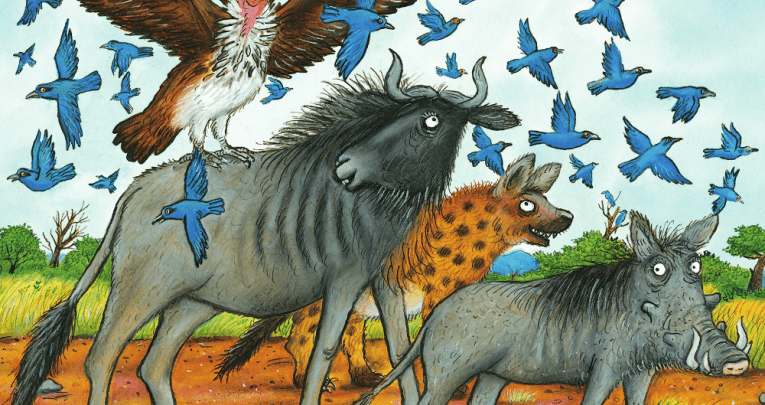Why Former Children’s Laureate Julia Donaldson Prefers Acting Out Stories for Children than Just Reading Them

“The best performers aren’t always the strongest readers”

I still have the book that helped me learn to read: Tiny Tot’s First Book of All. It’s big, with a pink cover, and introduces the alphabet as characters – so you have ‘Big Mister A’ (who looks like a ladder) and his brother, ‘little mister a’, and so on.
I just loved the way the letters all had personalities; Letterland does something similar, and it’s very appealing for children, I think.
Actually, I still have many of my books from childhood. I was a huge fan of the William series by Richmal Crompton, and E Nesbit was a favourite, too. I wasn’t keen on ‘adventure’ stories – although I enjoyed Malcom Saville’s Treasure at the Mill.
As a teenager I discovered Jane Austen, which my father and I would read aloud to each other. And reading Lord of the Flies was a defining moment for me – it was one of the first times I’d come across a story without a happy ending; I feel that book marked the end not just of my literary innocence but of my childhood.
I mostly enjoyed school – although I had a terrible time learning to knit. We had to use awful, greyish–white wool, which was more like string, and I simply couldn’t do it. One day, though, it finally clicked.
At the end of that lesson, we were all asked to hold our work up, then the teacher told everyone except me to put it down again.
I thought she was going to praise the fact that I’d got the hang of it at last, but instead, she told the whole class that my effort was a perfect example of how not to knit. I was thoroughly humiliated, and never did take to handicrafts after that.
I think if I’d known, aged seven, that several decades later I’d be coming back to that school as a successful, published author, I might have felt a little better.
I wrote a poem about the experience – it’s called Knitting Class and is in my book Crazy Mayonnaisy Mum.
What I did like about my education, was the way that teachers were allowed to have bees in their bonnets. They could follow their passions in the classroom – within reason – rather than being told what to teach all the time.
I remember one especially good teacher, Mr Davie, who loved italic handwriting and heraldry, so taught us both.
Heraldry was particularly interesting and exciting – we made shields out of plasticine, which we rubbed with the back of a drawing pin to make it shiny, and learnt fascinating things about heraldic language, like the way that ‘gules’ means ‘red’, and comes from the French word ‘gueule’, meaning the inside of an animal’s mouth.
By the time my own children started school, though, things had gone somewhat awry. I certainly wouldn’t argue in favour of bringing back the 11+, but if nothing else, it offered a framework. Without it, and before the introduction of the national curriculum, essentials could, and did, get missed.
Phonics was practically a dirty word for a while – and I remember going to one parents’ evening and finding my son’s maths exercise book completely blank. Visiting schools these days, I’m universally impressed by how much better both the teaching and the care are than they used to be.
The worry now, is that the pendulum has swung the other way. I love phonics and I think it’s something that should be offered to every child who is learning to read; but I’ve never been under the impression that it’s the one and only approach, or that it works for everyone.
And making six–year–olds sit a test in it, which they might fail – well, the impact of that can last right through the rest of their education. Children in England are far too tested, in my opinion.
I started acting out stories for children because, frankly, the idea of walking into a classroom full of seven–year–olds and just talking to them terrified me.
But there is definitely something in the idea of learning being easier when it’s interactive; one of the things I did as Children’s Laureate was set up a website, picturebookplays.co.uk, which explains how specific picture books can be acted out, either as a class activity or for a performance.
It’s great for encouraging expression, and improving understanding, as well as boosting confidence; the best performers aren’t always the strongest readers.
And most importantly, it’s fun!
The Ugly Five, the new picture book by Julia Donaldson and Axel Scheffler is out now (published by Alison Green Books) and A World Inside a Book: The Gruffalo, Dragons and other Creatures exhibition opens on 21 October discover.org.uk.
Illustrations from The Ugly Five © Julia Donaldson and Axel Scheffler, 2017.











